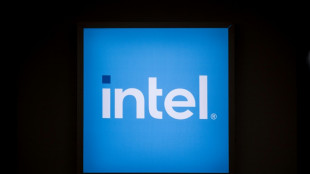
-
 Indian army says new exchange of gunfire with Pakistan
Indian army says new exchange of gunfire with Pakistan
-
Epstein accuser Virginia Giuffre takes own life in Australia: family

-
 Hundreds of buildings damaged, dozens injured in 6.3 Ecuador quake
Hundreds of buildings damaged, dozens injured in 6.3 Ecuador quake
-
India and Pakistan's Kashmir fallout hits economy too

-
 Francis's funeral to be grand farewell to 'pope of the poor'
Francis's funeral to be grand farewell to 'pope of the poor'
-
Pogacar faces defiant Evenepoel at Liege-Bastogne-Liege

-
 Chelsea eye great escape against Barcelona in Women's Champions League
Chelsea eye great escape against Barcelona in Women's Champions League
-
Iran, US to hold new round of high-level nuclear talks

-
 'Energy and effort' pay off for Reds as Blues' woes continue
'Energy and effort' pay off for Reds as Blues' woes continue
-
Albatross and closing birdie lift China's Liu to LPGA Chevron lead

-
 On the horizon? Wave of momentum for high seas treaty
On the horizon? Wave of momentum for high seas treaty
-
Developing countries should fast-track US trade deals: World Bank president

-
 Grizzlies' Morant 'doubtful' for must-win game 4 v Thunder
Grizzlies' Morant 'doubtful' for must-win game 4 v Thunder
-
Trump in Rome for pope funeral in first foreign trip of new term

-
 Trump says Russia-Ukraine deal 'very close' after new Kremlin talks
Trump says Russia-Ukraine deal 'very close' after new Kremlin talks
-
US rookies lead PGA pairs event with McIlroy and Lowry in hunt

-
 Trump tariff promises get a reality check
Trump tariff promises get a reality check
-
Warriors coach Kerr 'relatively optimistic' injured Butler will play game 3

-
 Postecoglou hopes 'Stonecutter's Credo' can inspire Spurs
Postecoglou hopes 'Stonecutter's Credo' can inspire Spurs
-
PSG lose unbeaten Ligue 1 record ahead of Arsenal showdown

-
 Venezuela accuses El Salvador president of 'human trafficking'
Venezuela accuses El Salvador president of 'human trafficking'
-
Own goal takes Sundowns to African final against Pyramids

-
 Scores of buildings damaged, 20 injured in Ecuador quake
Scores of buildings damaged, 20 injured in Ecuador quake
-
US stocks extend rally as market eyes busy calendar next week

-
 Pope's death triggers surge of disinformation he fought against
Pope's death triggers surge of disinformation he fought against
-
Rovanpera takes control of Rally Islas Canarias

-
 Zelensky insists Crimea is Ukrainian as US envoy meets Putin
Zelensky insists Crimea is Ukrainian as US envoy meets Putin
-
Patel and Mendis help Sunrisers beat Kings in Dhoni's 400th T20

-
 Copa del Rey ref statements 'unacceptable': Real Madrid after boycotting final build-up
Copa del Rey ref statements 'unacceptable': Real Madrid after boycotting final build-up
-
Insurance CEO's accused killer pleads not guilty to federal murder charges

-
 FBI arrests Wisconsin judge for shielding undocumented migrant
FBI arrests Wisconsin judge for shielding undocumented migrant
-
Brazil ex-president Collor de Mello jailed for corruption

-
 Zelensky insists Crimea 'belongs' to Ukraine as US envoy meets Putin
Zelensky insists Crimea 'belongs' to Ukraine as US envoy meets Putin
-
Real Madrid boycott Copa del Rey build-up over referee complaints

-
 Trinidad and Tobago votes for parliament, PM, with opposition in lead
Trinidad and Tobago votes for parliament, PM, with opposition in lead
-
IMF chief hails 'constructive' Spring Meetings held under tariff uncertainty

-
 Iran FM Araghchi in Oman ahead of nuclear talks with US
Iran FM Araghchi in Oman ahead of nuclear talks with US
-
Dozens of buildings destroyed, 20 injured in Ecuador quake

-
 Young Barca must 'enjoy' Real Madrid Copa final fight: Flick
Young Barca must 'enjoy' Real Madrid Copa final fight: Flick
-
Pakistan and India border closure separates families

-
 Brazil's Bolsonaro 'stable' after post-surgery setback
Brazil's Bolsonaro 'stable' after post-surgery setback
-
Catholics in secular Cuba hail Francis as 'bridge'

-
 US envoy Witkoff, Putin discuss 'possibility' of direct Russia-Ukraine talks
US envoy Witkoff, Putin discuss 'possibility' of direct Russia-Ukraine talks
-
Community seeks answers after French school knife killing

-
 German prosecutors seek jail terms in VW 'dieselgate' trial
German prosecutors seek jail terms in VW 'dieselgate' trial
-
Sabalenka makes winning start at Madrid Open

-
 EU, US should de-escalate and negotiate trade deal: IMF Europe director
EU, US should de-escalate and negotiate trade deal: IMF Europe director
-
Russia accuses Ukraine of killing general in car bombing

-
 Emery wants FA Cup glory and Champions League berth for Villa
Emery wants FA Cup glory and Champions League berth for Villa
-
Buildings destroyed, one injured in Ecuador quake


Has there finally been progress in treating schizophrenia?
For decades there has been almost no improvement in the medical treatment of schizophrenia, one of the most serious and devastating of all mental illnesses, but recent advances have raised hopes of progress.
The condition often only hits the headlines after violent attacks by sufferers, such as a schizophrenic patient who stabbed a nurse to death last week in the French city of Reims.
But French psychiatrist Sonia Dollfus emphasised that such cases of violence by people with schizophrenia are "extremely rare".
"All the work done over the years trying to de-stigmatise this disease -- it is swept away in 24 hours," Dollfus told AFP.
Around one in every 300 people worldwide are affected by schizophrenia, according to the World Health Organization.
It causes a wide range of distressing delusional disorders, which vary in intensity between patients but often hugely disrupts their lives.
At least five percent of schizophrenia patients are estimated to die by suicide.
The condition is usually treated with a combination of anti-psychotic drugs, social support for reintegration, and psychological therapy.
Scottish psychiatrist Robin Murray, who has spent decades researching schizophrenia, told AFP that when it came to medication, "treatment has not changed dramatically" over the last 20 or 30 years.
He added that psychological therapy had improved in that time.
But unlike numerous other mental disorders -- particularly neurotic conditions -- taking serious drugs remains the cornerstone in treating schizophrenia.
- Innovation -
For drugs, there has been a "blank period since the 2010s, when pharmaceutical laboratories really withdrew from psychiatry," Dollfus said.
But there has been some innovation recently, she added.
One development have been apps that can track patients' progress, ensure timely follow-up sessions and contact psychiatrists if necessary.
Another is a new treatment approved by the US Food and Drug Administration last month.
The treatment, developed by the Israeli pharmaceutical firm Teva and France's MedinCell, involves the drug risperidone which has long been used for schizophrenia.
It has traditionally been prescribed as a daily pill, but the new treatment is administered via injection, allowing the drug to be gradually released in the body over several weeks.
This makes it impossible for patients to miss a daily pill.
Interruptions to medication, often brought about by the psychosis the illness causes, are a common problem in treating schizophrenia.
For example, the attacker in Reims had been off his medication, according to several sources.
- 'Really promising' -
This new way of administering an old medication is not the kind of revolution that a new drug would represent. But progress may soon be made in that area.
Dollfus said that some drugs currently being investigated are "really interesting" because they work in a different way than those of the past.
Traditionally, anti-psychotic drugs used to treat schizophrenia aim to block the action of dopamine, a molecule that acts as a chemical messenger in the brain.
However, dopamine seems to play a complex role in schizophrenia -- some patients can have excessive levels in some respects and insufficient levels in others.
Traditional anti-psychotic drugs, which tend to work well at stopping certain symptoms such as hallucinations, do not help in other areas, such as the loss of willpower or struggles with language and speech.
Recent research has focused on finding other molecules which regulate rather than block dopamine, while also acting on other areas thought to be involved in schizophrenia.
These treatments, such as one that targets a protein called TAAR1, are still some way away from being available to patients.
But the TAAR1 drug has had positive results from the most advanced stage of trials, known as phase 3.
"This is a really promising avenue," Dollfus said.
M.Fischer--AMWN



